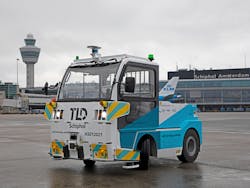Schiphol Tests Self-Driving Baggage Tractor
Schiphol has started a trial with an autonomous baggage tractor that will take baggage to the aircraft on the apron. The aim of the trial is to discover whether this technology is safe and efficient and how self-driving vehicles can be integrated with other traffic at the airport. The trial, which will last until the end of the month, is being carried out in collaboration with KLM Ground Services and Smart Airport Systems.
The trial will start in a defined area in which the baggage process is simulated. In the second phase, the trial will be continued in an operational environment to bring baggage to the aircraft. The self-driving vehicle will be loaded in the baggage area, after which it will navigate to an aircraft stand via a fixed route. During all the trials with the baggage tractor, there will be a safety operator in the autonomous vehicle to stop the vehicle if necessary. The self-driving vehicle was made by ground-handling equipment supplier TLD, with EasyMile supplying the autonomous software.
Rotterdam The Hague Airport and Eindhoven Airport will also be testing autonomous baggage tractors this spring. There, the airports will be testing this technology in conjunction with Vanderlande.
Autonomous Airside Operations
Royal Schiphol Group anticipates that by 2050, the daily operations on the apron at the airports will have changed significantly. The ground-based airport activities (e.g. baggage transport, passenger transport and aircraft towing) will not only be clean, but also smart and autonomous. The aim is ultimately to replace all vehicles on airside with an interconnected fleet of self-driving, emission-free vehicles, in order to guarantee and improve quality in the long term.
"Despite the coronavirus crisis, we are continuing to invest in quality and innovation. We have launched the ‘Autonomous Airside Operations’ program in order to work with airport partners step-by-step towards smart and future-proof ground handling. In this early phase, we are focusing on knowledge development through trials at various airports. This will allow us to combine insights and determine which bottlenecks require particular attention and which steps must be taken in the future as we work towards an autonomous airport. On this basis, we will then determine the concrete follow-up steps," said Hassan Charaf, head of innovation at Royal Schiphol Group.
"Jobs remain, even with autonomous technology. In future, it can be used for work for which it is difficult to find employees, or for work that is physically demanding. The human factor will remain crucial, for example in managing work and maintaining an overview. Employees will also be able to focus more on service," said Dennis van Kleef, head of baggage at Royal Schiphol Group.
